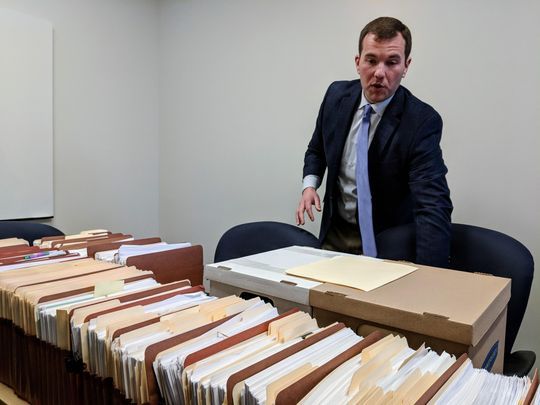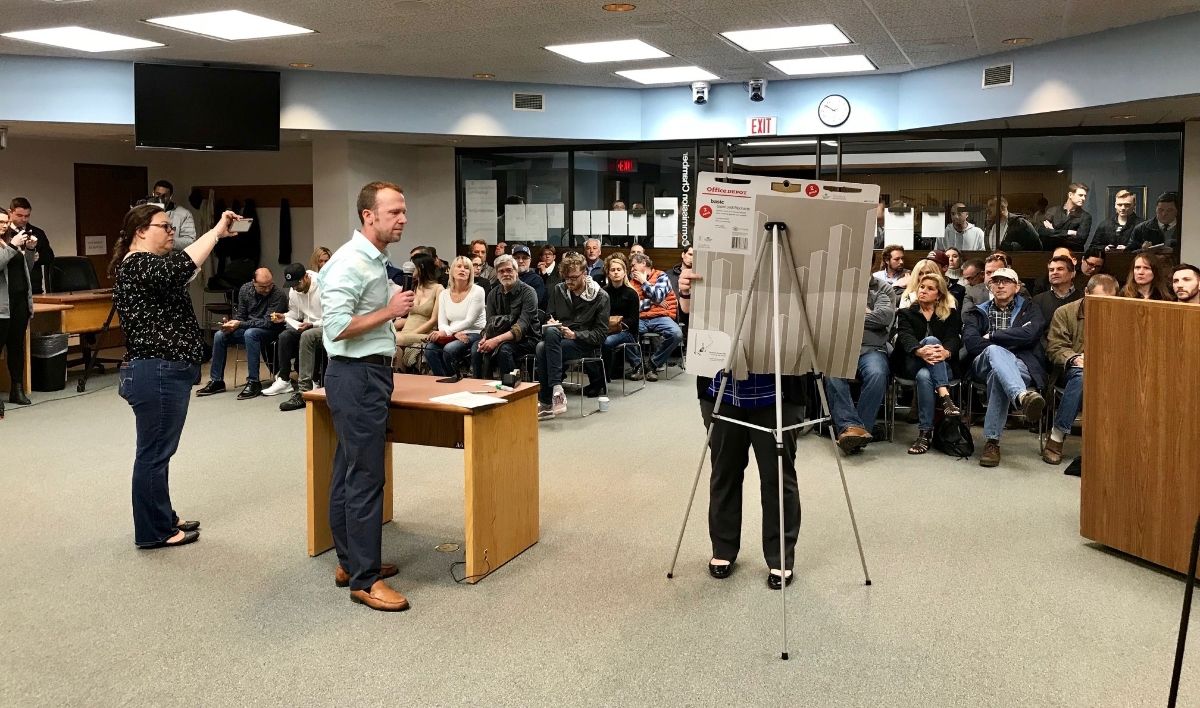Michigan's new marijuana agency will regulate a market in turmoil
When Michigan officially consolidates pot business oversight into the Marijuana Regulatory Agency on Tuesday, state officials will be expected to tackle tough issues that are roiling the medical and recreational marijuana markets.
There are lingering fears among Michigan’s marijuana businesses about the viability of a fully licensed market that has yet to produce a steady, tested supply that can meet the needs of dozens of provisioning centers across the state.
Among the issues the new agency will take over from the Bureau of Marijuana Regulation: Dealing with unlicensed medical pot shops that a judge may continue to let operate; considering and approving medical marijuana license applications, and creating new licensing rules for Michigan's nearly five-month-old recreational adult use law.
After its launch, the Marijuana Regulatory Agency is expected to issue emergency rules for recreational licenses and begin accepting license applications by the fall. It's an operation that potential applicants are hoping runs more smoothly than the litigation-plagued process for medical shops.
"I think what we’re hoping to see is some greater clarity and hopefully a uniform regulatory process for both the medical market and the transition into the adult recreational market," said Joe Neller of Green Peak Innovations, a licensed grower and processor in Dimondale.
Gov. Gretchen Whitmer’s executive order, which takes effect at the end of the month, combines adult use and medical marijuana regulation under one agency to streamline what has been a cumbersome and slow-moving licensing and regulatory process. The agency will bring a swift end to the hours-long public licensing meetings held by a licensing board that became a symbol of Michigan’s obstacle-laden transition to a marijuana state.
“All elements of this agency have been designed to serve and better protect Michigan residents, and I’m eager to have a unified effort across state departments to make sure this process runs effectively and efficiently," Whitmer said in a March 1 statement that accompanied the executive order.
The order was greeted with hesitance by some and hostility by others such as Medical Marihuana Licensing Board member Don Bailey, a longtime police officer whose tough licensing screening became the bane of applicants statewide.
Bailey said he’s worried the new system will cut corners in the name of efficiency when thorough due diligence is needed to ensure a safe and legal market.
“The only way to speed the (licensing) process up is to do less than we’re doing, and we’re doing woefully little right now,” he said.
In with the new
The existing Bureau of Marijuana Regulation has managed the medical marijuana licensing and the development of administrative rules for the licensed adult use market for several months.
On Tuesday, the bureau will become the Marijuana Regulatory Agency, the latest step toward full implementation of the 2016 medical marijuana licensing law and the adult use marijuana ballot proposal passed by voters in November.
The bureau will answer directly to the governor, but still rely on the Department of Licensing and Regulatory Affairs for services like finance and human resources. The agency will be led by Executive Director Andrew Brisbo, who serves as the current bureau's director.
Michigan's marijuana lead regulator Andrew Brisbo shows off the files from a single license application for medical marijuana in 2018. Brisbo will lead the new Marijuana Regulatory Agency. (Photo: Jonathan Oosting / The Detroit News)
The bureau has 102 full-time employees and a 2019 budget of roughly $19.7 million, said spokesman David Harns.
Recommendations for the 2020 fiscal year would increase the agency's ranks to 150 full-time employees and increase funding to $22 million to handle the additional workload of the recreational pot market.
The agency anticipates issuing emergency rules for recreational marijuana by June or July and will likely begin taking applications in September or October, Harns said.
Recommendations collected during "stakeholder" meetings in Lansing, Detroit and Marquette are expected to influence the new rules, which should mirror those developed for medical marijuana licensing.
The partial separation of the agency from LARA makes sense given the time and resources the marijuana industry is likely to monopolize, said Rick Thompson, a longtime cannabis advocate and publisher of Michigan Cannabis Industries Report.
“At this point, it makes sense to have all the administration under one roof,” Thompson said.
Changes in medical licensing
In the regulated medical pot market, the largest immediate change will be the end of medical marijuana licensing meetings that have become infamous for applicants and attendees.
The hours-long meetings held roughly once a month for more than a year have sparked disagreements, debate and appeals among applicants who argued they were mistreated by the appointed board or delayed by the state review of their applications.
The board's denials frustrated applicants who felt licensing standards were not applied equally or consistently, said Green Peak Innovation's Joe Neller.
Thompson is relieved the licensing board’s role will end.
“That was a circus,” Thompson said. “It was non-productive. It aired a lot of dirty laundry, and I didn’t feel like transparency was added."
While the state’s backlog of medical marijuana license applications once amounted to weeks and months, the state is now processing applications as they come in, Harns said.
The process is likely to speed up even more as the new agency takes over for the licensing board, said Shelly Edgerton, the former LARA director who now is senior counsel at Dykema Law. Edgerton, who registered as a lobbyist this year, now works with clients seeking licenses in the cannabis market and other industries regulated by LARA.
Brisbo's team likely is already planning to streamline the licensing and appeals process as well as increase staffing to accommodate the expected rush of applications for the recreational market, Edgerton said.
Among the biggest improvements expected from the new agency is a sort of “rolling application process” that doesn’t wait on monthly approvals from a licensing board, she said.
“I think you’ll see the ability of the department to respond more quickly,” Edgerton said.
While application reviews will no longer be public, the agency will hold quarterly public hearings to receive comments.
That combined with a running list of licensees should create a level of transparency similar to LARA's other licensing processes, Edgerton said.
Cleaning up landscape
Lingering uncertainties in the marijuana industry have led to divisions that were on display Wednesday as marijuana supporters protested on the Capitol lawn. One licensed business, Green Peak Innovations, argued for a stricter enforcement of state testing requirements, while other marijuana patients urged a delay of the requirements lest the state experience a shortage of medical marijuana.
Applicants and officials also want to resolve litigation that has halted the closure of unlicensed facilities that have been operating temporarily while seeking a license. A state appeals judge is expected to rule this week on whether and for how long the unlicensed facilities can remain open.
Buy Photo
Protesters urging the state to more strictly enforce medical marijuana testing standards organized on the Capitol lawn Wednesday, April 24, 2019. Counter-protesters also attended the event, asking the state to delay implementation of those standards so as to prevent a shortage in the market. (Photo: Beth LeBlanc/The Detroit News)
The unlicensed facilities and the desire of some licensed facilities to continue selling untested product are creating a cloud of uncertainty over the licensed market — one that Green Peak's Neller hopes the new agency will address quickly.
"We believe that they should require all product that is sold in the market to be tested," Neller said. "This is still a medical program and there is no other medical program that would allow untested product to the patient regardless of the waiver they would sign."
The Michigan Cannabis Industry Association called the protest "a short-term bump in the road" that the new Marijuana Regulatory Agency could address.
"We’d like to see an agency that is a partner with the industry as much as possible," said Josh Hovey, a spokesman for the Michigan Cannabis Industry Association. "We want to see an agency that helps bring the black market to its demise and also ensures that the licensed businesses are behaving responsibly.”

